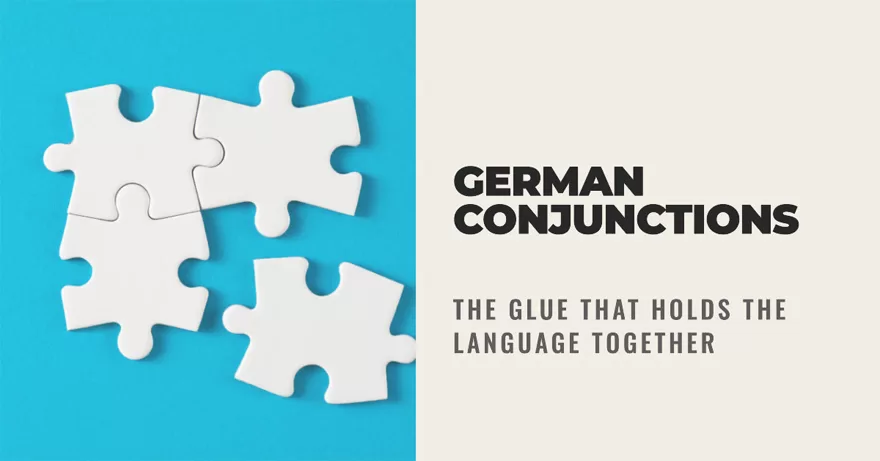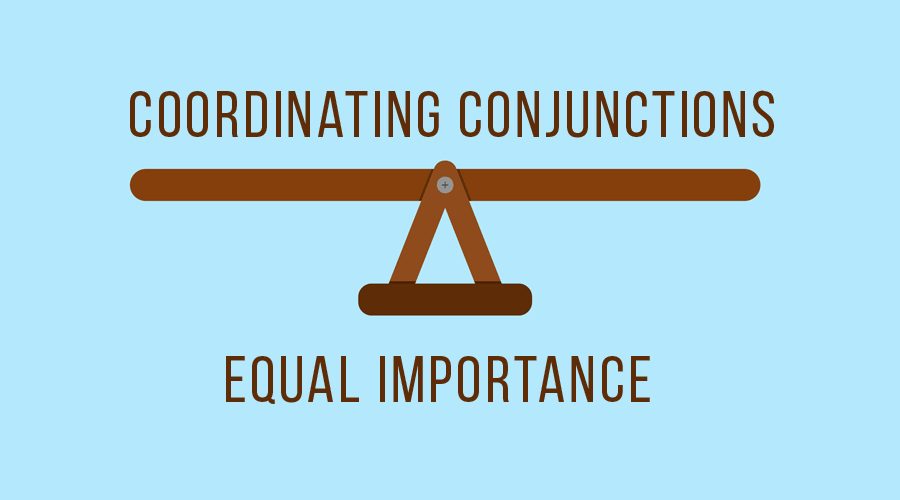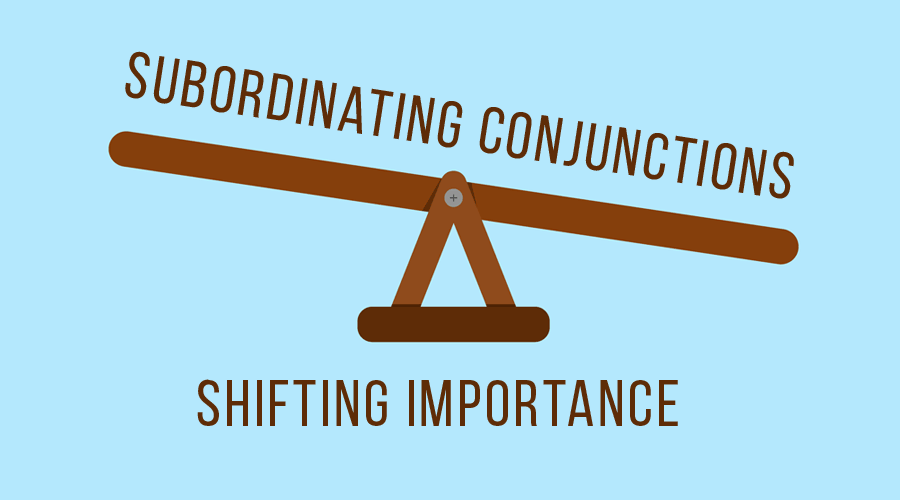
Picture this: you’re a master puzzle-solver. In front of you is a beautiful, 1000-piece jigsaw puzzle of the German language. The vivid pieces are scattered all around: verbs, nouns, articles, pronouns and more—waiting for you to assemble them into a coherent whole.
You’re starting to snap single words together, creating simple phrases, building up sentences … but wait, what’s this? There’s a bunch of disjointed fragments! How do we connect it all? Introducing German conjunctions, the magic glue that holds the puzzle together … or makes for a sticky mess if you’re not careful.
In this article, we’ll dive into the cold and cruel mesmerizing world of German conjunctions, exploring their various types, and the precise roles they play. So hold on to your hats and prepare for a thrilling ride through the landscape of conjunctions in German, where you’ll discover how they skillfully connect words, phrases, and sentences, allowing you to express increasingly complex ideas within neatly structured sentences.
What Is a Conjunction?
The word conjunction comes from the Latin conjungere (=to join together), and that’s exactly what they do! Conjunctions are words that connect and link words, phrases, or sentences.
They help create smooth transitions between ideas and establish relationships between different parts of a sentence, making the text or speech more coherent and comprehensible.
“No sentence can end with because, because because is a conjunction.” – C. N. Annadurai
They are also an essential ingredient for the infamous “Schachtelsatz”, a German term that translates to “nested sentence” or “box sentence” in English. It refers to a complex sentence structure in which multiple subordinate clauses are embedded within one another or “nested” inside a main clause.
This creates a sentence with multiple layers, like boxes inside boxes that can quickly get overwhelming, especially in literary, technical or academic texts. They can make sentences appear more formal and sophisticated but can also lead to difficulty in understanding the meaning due to the complexity of the sentence structure (you’ve been warned!).
Did you know for example that literary genius Thomas Mann in his opus “Joseph und seine Brüder” concocted a single unwieldy sentence that contains 347 (!) words? All thanks to the Schachtelsatz, enabled by a generous helping of conjunctions.
But let’s not get ahead of ourselves. First thing first.
Conjunctions can be categorized into different types depending on their function and the way they connect various clauses or phrases. Let’s have a look at some of them in the wild, shall we?
Coordinating Conjunctions: The Trusty Sidekicks
We start our journey with coordinating conjunctions. These trusty sidekicks are simple, straightforward, and easy to use. They’re the friends who’ll always have your back, helping you link two independent clauses or phrases that are equal in importance.
Think of coordinating conjunctions as the double-sided tape that sticks two equally significant pieces together.

In other words, coordinating conjunctions join parts of a sentence that can stand independently as complete thoughts. Here are some examples:
- und (and) – the quintessential connector
- Ich mag Äpfel und Bananen. (I like apples and bananas.)
- Sie geht gerne ins Kino, und sie fährt gerne Fahrrad. (She loves to go the movies and she loves to ride the bike.)
- aber (but) – used to express contrast or contradiction.
- Er ist intelligent, aber auch ziemlich faul. (He is intelligent but also pretty lazy.)
- Ich bin nicht der Schlauste, aber auch nicht der Dümmste. (I’m not the smartest, but also not the dumbest.)
- oder (or) – presenting alternatives and choices.
- Willst du Tee oder Kaffee? (Do you want tea or coffee?)
- Gehen wir tanzen, oder etwas trinken? (Should we go dancing or have a drink?)
- doch (yet) – undermining expectations with a twist of contrast.
- Du hast gesagt, du kommst, doch du bist nicht hier. (You said you’d come, yet you aren’t here.)
- Ich hasse Science-Fiction, doch ich liebe Star Wars. (I hate sci-fi, but I love Star Wars.)
- außer (except) – expressing limitations
- Ich trinke morgens immer Tee, außer sonntags. (I always drink tea in the morning, except on Sundays.)
- Sie liebt alle Tiere, außer Echsen und Ratten. (She loves all animals, excepts lizards and rats.)
- sondern (but rather) – when “aber” just won’t cut it to resolve a contrast.
- Sie lügt nicht, sondern sie sagt die Wahrheit. (She doesn’t lie but rather tells the truth.)
- Ich trinke keinen Kaffee, sondern Tee. (I don’t drink coffee but rather tea.)
Multi-Part Conjunctions
A subset of coordinating conjunctions are multi-part conjunctions such as:
- entweder… oder (either… or)
- Peter will entweder Medizin oder Jura studieren. (Peter either wants to study law or medicine)
- weder… noch (neither… nor)
- Ich mag weder Tee noch Kaffee. (I like neither tea nor coffee.)
- zwar … aber (indeed but)
- Ich mag zwar Hunde, aber keine Rottweiler. (I indeed like dogs, but not Rottweilers.)
- nicht nur … sondern auch (not only … but also)
- Sie isst nicht nur gerne chinesische Nudeln, sondern auch japanische Suppen. (She doesn’t only love Chinese noodles, but also Japanese soups.)
- sowohl … als auch (both… and)
- Wir haben sowohl Berlin, als auch Frankfurt besucht. (We visited both Berlin and Frankfurt.)
Subordinating Conjunctions: The Puppet Masters
Now, let’s move on to the puppet masters of German conjunctions: subordinating conjunctions. These cunning words hold the power to control and manipulate entire clauses, dictating their grammatical structure and subjugating them to another clause (how dare!).
Note: when a subordinating conjunction enters the scene in German, the verb in the subordinate clause usually moves all the way to the end, like an Englishman swiftly latching on to the tail end of a queue. 🎩

Some of the key players in the subordinating conjunctions realm are (and note the shift of importance between main clause and subordinate clause):
- weil (because) – the explainer, providing the much-needed background story behind actions and events.
- Ich bin müde, weil … (I’m tired because …)
- ich lange gearbeitet habe. (I worked long hours.)
- ich wochenlang nicht gut geschlafen habe. (I haven’t slept well in weeks.)
- ich gestern auf einer Party war. (I was on a party yesterday.)
- Ich bin müde, weil … (I’m tired because …)
- dass (that) – the introducer, presenting subordinate clauses that express statements or thoughts.
- Ich denke, dass … (I think that … )
- es regnen wird. (I think that it’s going to rain.)
- das keine gute Idee ist. (this isn’t a good idea).
- du mich verstehst. (you understand me.)
- Ich denke, dass … (I think that … )
- ob (if/whether) – the investigator, probing the existence of possibilities and alternatives (yes/no).
- Ich weiß nicht, ob … (I don’t know if/whether )
- sie kommt. (she’s coming.)
- es regnen wird. (it will rain.)
- der neue Film schon draußen ist. (if the new film is out yet.)
- Ich weiß nicht, ob … (I don’t know if/whether )
- wenn (if, when) – the time traveler, transporting you through conditional or temporal scenarios.
- Wir fahren nicht in den Urlaub, wenn … (We don’t go on vacation when/if …)
- die Preise zu hoch sind. (the prices are too high.)
- Sarah krank ist. (Sarah is sick.)
- deine Noten nicht besser werden. (your grades aren’t improving.)
- Wir fahren nicht in den Urlaub, wenn … (We don’t go on vacation when/if …)
- obwohl (although) – the expert juggler, balancing contrasting ideas with grace and finesse.
- Es ist kalt, obwohl … (It’s cold, although …)
- die Sonne scheint. (the sun is shining.)
- es Mitte Juni ist! (it’s mid June!)
- der Himmel blau ist. (the sky is blue.)
- Es ist kalt, obwohl … (It’s cold, although …)
- bevor (before) and nachdem (after) – the dynamic duo, guiding you through the twists and turns of time.
- Ich habe Kaffee getrunken, bevor … (I drank coffee before …)
- ich in den Bus gestiegen bin. (having boarded the bus.)
- ich den Rasen gemäht habe. (having mown the lawn.)
- Ich habe Kaffee getrunken, bevor … (I drank coffee before …)
- Ich habe Fernsehen geschaut, nachdem… (I watch TV, after …)
- ich meine Hausaufgaben gemacht habe. (having done my homework.)
- ich das Geschirr gespült habe. (having done the dishes.)
- Ich habe Fernsehen geschaut, nachdem… (I watch TV, after …)
Other subordinating conjunctions are so dass (so that), bis (until), seitdem (since), wohingegen (whereas), indem (while/as), falls (in case that), nachdem (after).
Conjunctive Adverbs: The Native Constituent
Are you still with us? Good. You may want to refill your cup of tea or joe for the next part.
Conjunctive adverbs (in German, “Konjunktionaladverbien”) are adverbs that function as connectors between sentences, clauses, or phrases. The difference between conjunctions and conjunctive adverbs is that conjunctive adverbs are sentence constituents, while conjunctions are not.
Tomayto, tomahto? 🍅
It may not sound important but this difference means that conjunctive adverbs count as an actual part of the sentence and therefore go to the first position. (Regular conjunction aren’t strictly considered part of the sentences they connect, that’s why we also speak of “zero position”).
- jedoch (however) – Indicates a contrast or opposition between two ideas.
- Er wollte ins Kino gehen, jedoch hatte er keine Zeit. (He wanted to go to the cinema; however, he had no time.)
- daher (therefore) – Shows a cause-and-effect relationship or a logical conclusion.
- Es ist kalt draußen, daher ziehe ich eine Jacke an. (It’s cold outside; therefore, I’m putting on a jacket.)
- trotzdem (nevertheless) – Expresses the idea that something happened or is true, even though it was unexpected or contradicted a previous statement.
- Er war müde, trotzdem ging er zur Party. (He was tired; nevertheless, he went to the party.)
- deshalb (that’s why) – Indicates a logical consequence or reason for something.
- Sie hat den Bus verpasst, deshalb kam sie zu spät. (She missed the bus; that’s why she was late.)
- zudem (moreover) – Adds additional information or reinforces a previous point.
- Sie ist sehr intelligent, zudem ist sie auch fleißig. (She is very intelligent; moreover, she is also hardworking.)
Let’s do a quick comparison between the sentence structure while using coordinating conjunctions vs conjunctive adverbs.
Sarah liebt Pizza undHaraldliebt auch Pizza. (conjunction -> noun -> verb)
With standard conjunctions the verb occupies the second position, since that’s where they usually go in a German sentence.
Sarah liebt Pizza, daherliebtHarald auch Pizza. (conj. adverb -> verb -> noun)
The conjunctive adverb however goes to the first position, since it’s a constituent of the second clause. As opposed to subordinating conjunctions who send the verb scurrying to the end, conjunctive adverbs never do that, since they’re always introducing a main clause.
Here are some more conjunctive adverbs in German:
| Conjunctive Adverb | English Translation |
|---|---|
| allerdings | however |
| also | so, therefore |
| andererseits | on the other hand |
| außerdem | besides, moreover |
| dadurch | thereby |
| dann | then |
| dennoch | nevertheless |
| deswegen | because of that |
| folglich | consequently |
| nämlich | namely |
| sonst | otherwise |
| stattdessen | instead |
| übrigens | by the way |
| zunächst | first of all |
Put Your Knowledge To The Test
Here’s a little exercise covering coordinating conjunctions, subordinating conjunctions, and conjunctive adverbs in German.
Fill in the blanks with the appropriate conjunction or conjunctive adverb from the list provided. You can refer back to our previous discussions for guidance.
Conclusion: The Art of Conjunctions in German
As we reach the end of our exploration, it’s evident that German conjunctions are the unsung heroes of the language. They play an essential role in binding words, phrases, and sentences together, creating a cohesive and harmonious linguistic masterpiece.
By mastering the use of coordinating, subordinating and conjunctive adverbs, you’ll have the tools to assemble the German language puzzle with ease and grace. As with everything German grammar, practice makes perfect! There are many good sources for free German worksheets and textbooks where you’ll find plenty of opportunity to hone your skills.
So, the next time you find yourself grappling with German sentence structure, remember to summon these cheeky little buggers to your aid.
–

